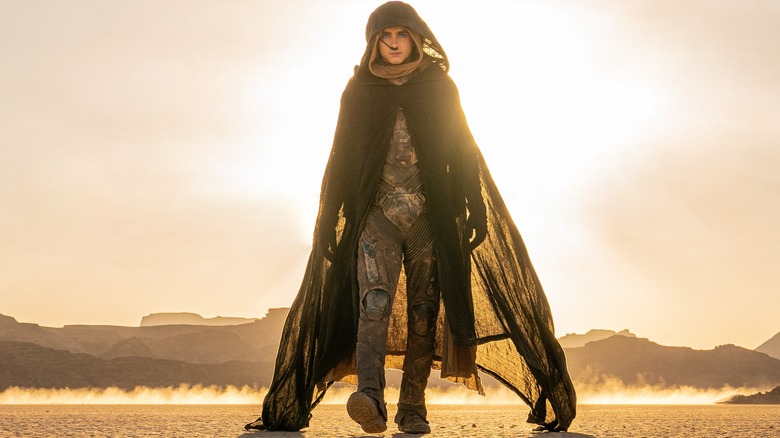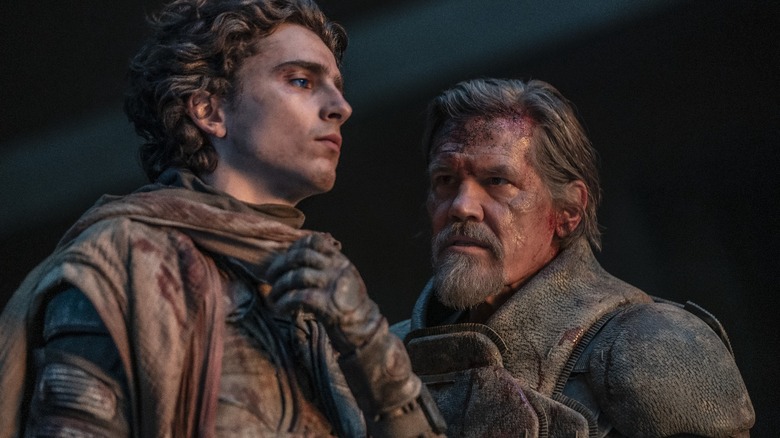Denis Villeneuve Has 'Mixed Feelings' About His Dune Films
Adapting Frank Herbert's "Dune" novel series to the big screen is no small feat. The scale of Herbert's world-building and the complex optics of the thematic threads that run through the story are fairly tricky to translate to the visual medium. A quick look at the history of adapting "Dune" would lead you to several efforts: David Lynch's 1984 film is delightfully weird but fails as an adaptation, while Alejandro Jodorowsky's unmade film ran into a ton of problems despite inching towards a workable script. Enter Denis Villeneuve's "Dune," and his recently released "Dune: Part Two," which managed to accomplish what was long thought to be impossible by birthing a saga that is both faithful to the books and imbued with the director's creative liberties.
Adaptations are bound to be flawed, as it is often tough to reconcile a beloved novel franchise's context-specific shortcomings with evolving perspectives, and Villeneuve is acutely aware of this dissonance. For Villeneuve, adapting "Dune" was an adolescent dream, where he designed storyboards with his best friend, Nicolas Kadima, while nurturing the passion to bring Herbert's complex, intriguing world to life someday. Although that dream has come true, Villeneuve's feelings toward his work remain "mixed," as revealed in an interview with The Hollywood Reporter where he shares the joys and anxieties of working on something that holds deep personal significance for him.
When asked why Herbert's "Dune" appealed to him, Villeneuve explained that "there was something about the journey of a young man who finds a home in another culture, in the deep desert, that absolutely spoke to" him. But the truth of "Dune" lies in the horrors that come right after that immersion into a new culture, with the rise of a messiah figure and the complicated human impulses that development elicits.
Villeneuve wondered if he was doomed to fail with Dune
When asked whether he felt satisfied with his adaptations so far, Villeneuve expressed how everyone's excitement toward the undertaking was understandably laced with anxious hesitation, and the fear of failure:
"I have mixed feelings. When I embarked on this adaptation, the first artist I approached was Hans Zimmer, and as much as we were excited by the prospect, I remember him asking me, 'Is it a good idea to try to bring our childhood dreams to the screen? Are we meant to fail?'"
However, with both "Dune" and "Dune: Part Two," it is amply clear that Villeneuve engages with Herbert's novels with sincere passion, reflected in the sheer scale and scope of a world that feels vibrant due to the warring intricacies of its characters as opposed to just its aesthetics. Villeneuve states that "some moments" have lived up to his childhood self's vision, while the rest is something he is still adjusting to:
"...There have been many moments with the Fremen and Harkonnens that are close to my dream and would have pleased me as a teenager. There are other things that I changed because of the process of adaptation, so it'll take me years to digest all this. It was the most challenging experience of my life, technically and cinematically, but I still wake up in the morning feeling blessed that I had the chance to make this adaptation."
Although a possible "Dune: Part Three" is currently not written in stone, Villeneuve wishes to circle back to this after working on other long-in-the-works projects, such as "Rendezvous with Rama," based on Arthur C. Clarke's novel of the same name. Let's hope he feels a bit less mixed about that project after it's completed.

